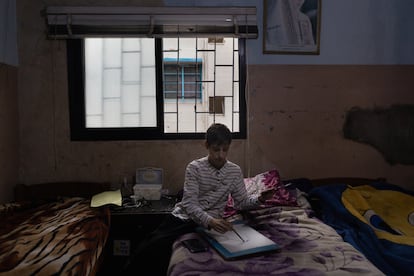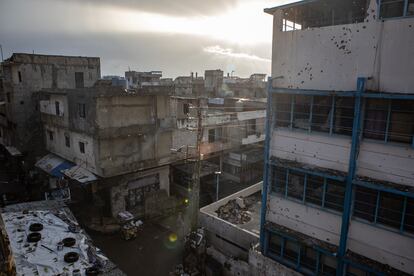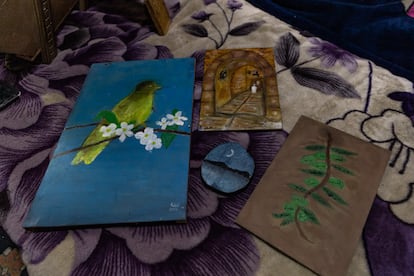The future of Ein el-Hilweh, the massive Palestinian refugee camp in Lebanon whose fate is linked to Gaza
Violence between varying factions ceased after the outbreak of war in October, but there is fear that fighting will break out if a ceasefire in the coastal enclave

He paints so as not to forget. “And to tell, through art, what the Palestinian people are going through,” Rahif Almeari explains, somberly. At 13 years old, he is surely the youngest artist at Ein el-Hilweh, the largest refugee camp in Lebanon, which is considered a kind of capital of the country’s Palestinian community. On panels of wood, the adolescent, who is the grandson of a carpenter who was driven from his home in 1948 following the creation of the state of Israel, paints the symbols of his grandparents’ homeland. “Israel wants to erase our culture, but it is my responsibility as an artist to paint the olive trees and the keffiyeh to tell the Europeans and all foreigners who we are,” he explains.
The 60,000 inhabitants of Ein el-Hilweh, which is the site of frequent showdowns between factions, follow the news from Gaza fearfully, because they sense that more than ever, their future survival is tied to what happens in the coastal enclave. “With what we are suffering, it makes no sense to be at each other’s throats,” says Almeari, indicating the marks of bullet holes in his bedroom. They are a reminder of the last outbreak of violence in the camp, which began last summer after the assassination of General Abu Ashraf al Armoushi, a high-ranking official from the Palestinian nationalist movement Fatah, the party of the current Palestinian government led by Mahmoud Abbas. His death was attributed to radical militias with ideological ties to jihadist groups like the Islamic State and the Al-Nusra Front, which through the years have found refuge in Ein el-Hilweh.
In that wave of conflicts between groups linked to Fatah and more extremist movements, at least 11 civilians died and more than 40 were injured. “They attacked the heart of the Fatah military branch with the goal of politically weakening us,” Yusef Zraihy, head of the party in southern Lebanon, told EL PAÍS.
But the war in Gaza put an end to these internal battles and in mid-October, rival militias arrived at a tacit agreement to lay down their weapons. These conversations moved forward with mediation by the Lebanese government, but the inhabitants of Ein el-Hilweh fear that a possible ceasefire in the Gaza Strip could mean the return of violence to their camp. Life in its streets has been paralyzed for nearly the past seven months and the bombings and death tolls in Gaza fill both daily conversation in the market and prayers, amid the general sense of helplessness over not being able to help their compatriots.
“All eyes are on Gaza and the political and security situation in the camps is calm. Still, we fear that when the war ends there could be an outbreak of new conflict,” says Samer Mannaa, a Palestinian activist. “And whoever controls Ein el-Hilweh will control the refugee community,” he concludes.

Ein el-Hilweh is located just a few miles from the coastal town of Sidon, a city in southern Lebanon. It is the largest of the 12 refugee camps that were created in the country after the 1948 Nakba — “catastrophe” in Arabic — in which Palestinians were forcibly driven from their homes. Today, according to numbers from the United Nations Relief and Works Agency for Palestine Refugees in the Near East (UNRWA), there are 500,000 registered refugees in Lebanon, including those who were driven out more than 70 years ago, and their descendants. The same agency estimates that no more than 250,000 refugees continue to live in the country, with the rest having emigrated elsewhere. Of this total, 200,000 receive annual assistance from the organization, which calculates that 80% of Palestinian refugees live in poverty.
A thousand shrapnel holes
With his gaze fixed upon an open book resting on his knees, Almeari waits in front of the small candy stand his family runs outside the front door of their house. The entire street, from the metal of the stand to the cardboard that protects it from the sun, is strafed with a thousand shrapnel holes, a landscape that has become normal at the camp. The boy sets off to look for the heavy, rusty keys for the doors of the house that his grandparents lived in until 1948 — reminders that Palestinian refugees and their descendants treasure. His father, Hussein Almeari, a carpenter who was also born in the refugee camp, has a map of the family lands that his father carved into wood. Rahif seems to have inherited his elders’ passion, creating scenes from acrylic paint on pieces of wood his father prepares for him.
“I adore Ein el-Hilweh, it is my home. That’s why it hurts me so much to see it like this,” says Hussein Almeari, gesturing to the walls. When the wave of violence took hold last July, the family evacuated the camp. When they came back at the end of October, their home had been nearly destroyed: they found numerous bullets embedded in the walls, which had been ripped through by explosives.
Their home is located at the crux of different neighborhoods which, just like the UNRWA schools, were the battlefields of rival militias. It’s not the first time that the educational facilities of Ein el-Hilweh have been occupied and destroyed, Dorothee Klaus, director in Lebanon of the U.N. agency, tells EL PAÍS. “Our response in the past was to increase fortifications to protect the children, but that had the opposite effect and turned schools into attractive areas for military operations,” she says.

The UNRWA — which employs 3,500 refugees in Lebanon — provides health services, education, basic infrastructure, social assistance and sanitation. “The host government has made it clear that it has neither the will nor the capacity to take on this responsibility, either politically or financially,” the director says. The lives of the Palestinian refugees are governed by autonomous rules that are independent of Lebanon, which in 1969 — two years after the Six-Day War, which caused the second large migratory wave of Palestinians to Lebanon — ceded political and security administration of the refugee camps to the Palestinian community.
Stripped of their rights
But that apparent Palestinian sovereignty in the Lebanon camps does not appear to have come with rights. A national regulation denies the refugees access to citizenship and property rights and also restricts the possibility of them occupying positions in key professions like medicine, law and engineering. “The Lebanese state deprives us of our basic human rights. We’re not even second-class citizens, because we’re not citizens,” says Hatem Mokdade, an unaffiliated activist.
The disappointment felt in the camps is refracted onto the United Nations agency, which has been accused of a lack of response. “We have not abandoned our right to return, but right now we need electricity, basic services and to address issues of corruption. The UNRWA has spent 75 years in a state of emergency, but what we need is development,” says Mokdade.
In addition to the complexity of the Palestinian situation, there is the reality of a Lebanon that is in permanent crisis and which, since October, has been in a war against Israel on its southern border through pro-Iranian militia Hezbollah. Plus, there are UNRWA’s economic difficulties, now exacerbated after donor countries suspending funding following Israel’s allegations that 12 of the U.N. agency’s staff had participated in the Hamas October 7 attack. In that attack, 1,200 Israelis were killed and more than 200 were taken hostage, a hundred of whom remain in the hands of their captors in Gaza.
The U.S. Congress has blocked the Biden administration from resume UNRWA financing until March 2025 at the earliest. The United States is the agency’s primary source of funds, but other countries, like Spain, have diverged from the U.S. decision and announced additional aid to keep the agency in operation. The Colonna Report, an independent investigation commissioned by the United Nations and led by former French foreign minister Catherine Colonna, which was published on Monday, April 22, concluded that Israel has not provided evidence to support its accusations against the UNWRA.
Translated by Caitlin Donohue.
Sign up for our weekly newsletter to get more English-language news coverage from EL PAÍS USA Edition
Tu suscripción se está usando en otro dispositivo
¿Quieres añadir otro usuario a tu suscripción?
Si continúas leyendo en este dispositivo, no se podrá leer en el otro.
FlechaTu suscripción se está usando en otro dispositivo y solo puedes acceder a EL PAÍS desde un dispositivo a la vez.
Si quieres compartir tu cuenta, cambia tu suscripción a la modalidad Premium, así podrás añadir otro usuario. Cada uno accederá con su propia cuenta de email, lo que os permitirá personalizar vuestra experiencia en EL PAÍS.
¿Tienes una suscripción de empresa? Accede aquí para contratar más cuentas.
En el caso de no saber quién está usando tu cuenta, te recomendamos cambiar tu contraseña aquí.
Si decides continuar compartiendo tu cuenta, este mensaje se mostrará en tu dispositivo y en el de la otra persona que está usando tu cuenta de forma indefinida, afectando a tu experiencia de lectura. Puedes consultar aquí los términos y condiciones de la suscripción digital.








































